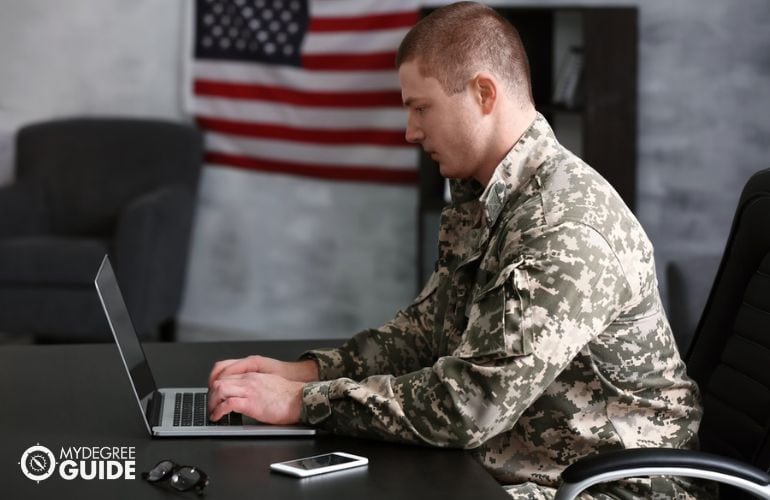As a service member who is interested in furthering your education, you might be asking, “Can you go to college while in the military?”

At this point in your life, it might seem like you don’t have much in common with most college students. Even still, college is possible for you while in the military, especially if you choose a military-friendly school.
Editorial Listing ShortCode:
In fact, there are multiple reasons to consider taking college classes while you are still on active duty.
Can You Go to College While in the Military?

Yes, you can go to college while in the military. A college education could help you advance in your military career or provide you with skills for the transition to civilian life. Plus, furthering your education could help you fulfill personal goals for growth and development.
Despite your desire to go to college, you may be wondering, “Can you be in the military and go to college at the same time?” That’s an understandable concern. Going to school during your military service requires flexibility. You might be required to balance your work, family, and school responsibilities.
Fortunately, there are military-friendly colleges that cater to students in your situation. Many of them offer online or hybrid classes with schedules designed for working adults—even deployed ones!
An additional benefit of attending a military-friendly college is that you will likely have military classmates. Rather than being in courses with students fresh out of high school, you may have the chance to build relationships with other military adults.
There’s also a range of financial support options available for military members and veterans, which can make higher education more accessible.
Military Educational Opportunities for Service Members

Instead of joining the military after college, you might consider doing college and military service at the same time. There are financial benefits to doing so.
Active-duty members of the military can take advantage of the Military Tuition Assistance program. The specifics vary between branches, but you may receive up to $4,500 in funding each year. The program typically covers $250 per college credit hour. See if all branches have tuition assistance programs when you attend college while in the military.
If you need additional help, you can use your Montgomery GI Bill-Active Duty (MGIB-AD) or Post-9/11 GI Bill benefits. The $600 Buy-Up program or Tuition Assistance Top-Up option may provide even more assistance. It’s also possible to use your GI Bill benefits after leaving the military.
Whether you’re attending college as an active-duty member or as a veteran, you can also fill out the Free Application for Federal Student Aid (FAFSA). This form determines your eligibility to receive grants or loans from the federal government and your state.
Your college may also provide you with scholarships to reduce your tuition bill. Some schools and universities offer military tuition discounts. If you choose a state university, you may be eligible to receive in-state tuition in the state where you’re stationed.
Advantages of Pursuing Higher Education During Service
Pursuing higher education while in the military offers multiple advantages that can contribute to both personal and professional growth.
| Advantage |
Description |
| Tuition assistance | Military programs like Tuition Assistance (TA) and the GI Bill can help cover the cost of your education. |
| Career advancement | A degree can lead to more opportunities in both the military and civilian workforce. According to the Social Security Administration, higher education is also linked to increased earning potential. |
| Flexibility | Online classes allow you to study on your own time, no matter where duty calls. |
| Skill development | You could develop crucial skills like problem-solving and critical thinking that can benefit you in both military and civilian life. |
| Network building | You might have the opportunity to connect with fellow students and professionals who could impact your future. |
Not only does a college education help you establish a solid foundation for post-service civilian life, but it could also make way for potential advancement within the military.
Balancing Service Duties and Academic Obligations (Career, Life, and Schools)

While going to school can be rewarding, here are some potential challenges active-duty personnel face when attending college:
- Busy schedule. As a working adult, you likely have many responsibilities in addition to school. You may prefer a college program that offers flexible schedules designed for adult learners.
- Financial obligation. College can be costly, and you may be unsure whether your military salary is sufficient. Fortunately, military financial aid programs can put a serious dent in the tuition burden.
- Major transitions. There is a chance that you could be deployed while in the middle of a course. Military friendly online schools could be the solution since you can keep up with your schoolwork from afar.
- Non-traditional age. You may feel older than many of the students on a traditional college campus. This is another reason many choose a school that caters to working adults.
Despite the challenges, college classes may help you improve your salary, your rank, or your sense of personal fulfillment.
Maximizing Flexibility in Your Work and Study Schedule
Here are some practical strategies for striking a balance between the demands of military service and higher education:
- Communicate openly. If you keep both your military supervisors and academic advisors informed about your commitments, they may offer support and flexibility where possible.
- Prioritize and plan. You can use a planner to prioritize your tasks and schedule specific times for work, study, and rest, adjusting as necessary.
- Explore online programs. Online courses offer the flexibility to study from anywhere, helping you fit your education around your military responsibilities.
- Leverage technology. Educational apps and digital calendars can help you keep track of assignments and deadlines.
- Stay organized. Keeping your study materials and military gear separate but organized could help you efficiently switch between roles.
Flexibility is key when it comes to balancing your work and study schedule. You might find that the above approaches help you manage your military duties alongside your academic endeavors.
Educational Paths for Military Personnel

There isn’t a one-size-fits-all approach to getting a degree as a member of the military. You may want to consider each of the following ways of taking classes.
On Base
To attend in-person classes with other military personnel, you can check into whether courses are available on your base.
You would be expected to attend class at set times, and your degree options may be limited. On the plus side, it should be a short commute to and from class, and you may appreciate the accountability that comes from being face-to-face with your instructors.
Branch Campus
Some colleges set up branch campuses near military bases. The experience may be similar to that of attending school on base. There could be more of a commute, though, and the classes might have a mix of military personnel and civilians.
Online Programs

If you’re organized and self-motivated, you could look into online colleges for military members. You’ll likely have around-the-clock access to learning materials, and the courses can travel with you, even if you’re deployed or relocated.
An admissions counselor can help you figure out the most suitable option for your circumstances.
How to Choose a Military Education Program
For the best educational experience, it is strategic to choose a college that is a good fit for you. Here are some common factors to consider:
- Accreditation. For a reputable education, it’s essential to select a school with regional accreditation.
- Format. There are many online military friendly colleges that offer flexible class scheduling. Other options include hybrid and in-person degrees.
- Funding. You can use your military education benefits at many colleges, but even more funding may be available from schools that participate in the Yellow Ribbon GI Education Enhancement Program.
- Military and veteran support. Some colleges have mentors, support groups, and other services for students with a military background.
- Transfer credit. You might be eligible to receive college credit for your military experience.
There are a number of colleges that specifically cater to military personnel, helping you receive the most benefits possible.
Admission Requirements to Attend College
Here are some typical college admissions requirements for service members:
- High school diploma or GED. This is a standard requirement for most colleges.
- Transcripts. You’ll submit transcripts from high school and any previously attended postsecondary institutions.
- Standardized test scores. Some schools no longer require SAT or ACT scores, but others do.
- Military transcripts. You’ll submit your Joint Services Transcript (JST) or equivalent document, as it details your military training and experiences.
According to the American Council on Education, some schools grant credit for military training or experience. You can check with prospective schools about their specific admission policies regarding service members.
Does the Military Pay for College?

This often leads to the question, “How long do you have to be in the military to get free college?” You may be able to get a portion of your college—or even the full tuition—covered by the military. For active duty service members, the Military Tuition Assistance program may contribute over $4,000 to your tuition expenses each year. Add-on programs can increase this benefit even further.
GI Bill benefits can also be an option for paying for college while in the military. These benefits remain in place in the years after leaving the military, so you could choose to use them as a veteran instead.
Is the GI Bill Accepted by Every College?
While the GI Bill provides significant educational benefits for veterans and active-duty military personnel, it’s important to note that not all colleges accept it.
You can use the GI Bill Comparison Tool on the Veterans Affairs’ website to check whether a specific school accepts these benefits. This tool also provides information about each school’s value and affordability, which can help you make an informed decision about your education. It’s also strategic to contact prospective schools to verify their policies on accepting GI Bill benefits.
How Do You Cover Tuition Fees That Exceed Assistance Benefits?
There are several avenues you can explore to help cover the cost of any tuition fees that exceed assistance benefits.
According to the US Department of Education, you can fill out the FAFSA to apply for need-based aid. Common forms of federal aid include grants, loans, and work-study programs. There are also various organizations and schools that offer scholarships specifically designed for military personnel and veterans.
If you’re employed in a civilian job, you can check whether your employer offers tuition reimbursement programs as part of their benefits package.
How Many Classes Can You Take While on Active Duty?
The number of classes you can take while on active duty largely depends on your personal schedule and workload. Some service members can handle 1 or 2 courses per term, but many take up to 3.
The degree of flexibility provided by your school is another contributing factor. Many universities offer online courses specifically designed for active-duty military personnel, letting you study at your own pace. It’s strategic to find a balance that allows for academic success without compromising military responsibilities.
An academic advisor could help you create a manageable course load based on your unique circumstances.
Can Military Experience Count Towards College Credit?
Military experience can often count toward college credit. According to the Department of Veterans Affairs, the process typically involves sending schools your Joint Services Transcript (JST), which records your military training and experiences. You may also take a standardized test, like DSST exams, to demonstrate proficiency in certain subjects.
In addition, some colleges ask for a learning evaluation from ACE. According to the American Council on Education (ACE), they collaborate with the Department of Defense to provide recommendations for translating military training into academic credits. Since each institution has its own policies regarding this process, it’s essential to check with prospective schools about their specific requirements.
Is Getting a Degree While in the Military Worth It?
Yes, getting a degree while in the military is worth it for many military service members. Earning college credit while you’re in the military can help prepare you for a future transition to civilian life.
With a degree in hand, you may have more job opportunities—and higher pay—available to you during your post-military career. A degree could also assist with your chance of advancement within the military. According to a report from the Department of Defense (DoD), 9% of enlisted active duty personnel have a bachelor’s degree or higher, but 85.5% of active duty officers do.
Attend College While in the Military

Higher education doesn’t have to wait until your return to civilian life. You can get a college degree while you’re still in the military.
The skills and knowledge that you can gain could benefit you right away and also in the future. Does the military pay for college? Yes! With military college programs, you may have both financial and educational support to help you through the process. Online college programs can be especially beneficial for students who are currently in the military. Many schools offer flexible online class schedules that meet the needs of working adults.
You can explore your options for an accredited degree, like an online military science degree, from a military-friendly college today!
